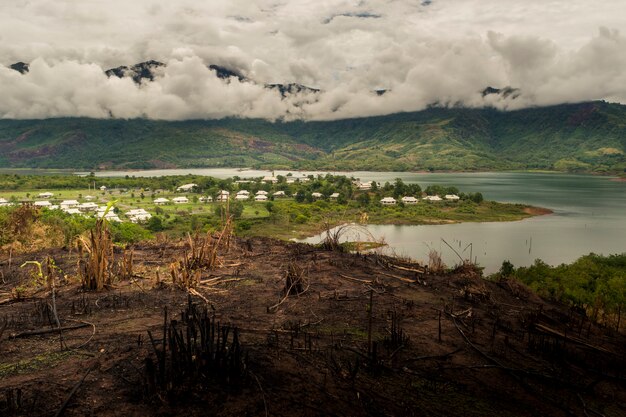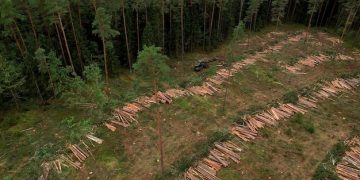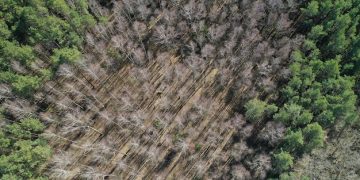Deforestation & Displacement: An Ethical Dilemma for US Indigenous Communities

Deforestation and the displacement of indigenous communities in the US raises significant ethical concerns, impacting cultural heritage, land rights, and environmental sustainability, demanding careful consideration and just solutions.
The intersection of deforestation and the displacement of indigenous communities in the United States presents a complex ethical dilemma, forcing a critical examination of land rights, environmental stewardship, and social justice.
Deforestation’s Pervasive Impact on Indigenous Lands
Deforestation, driven by agriculture, logging, and mining, has profound consequences for indigenous communities, who often depend on forests for their livelihoods, cultural identity, and spiritual well-being. This section sheds light on the direct and indirect impacts of deforestation on indigenous lands.
The loss of forest ecosystems disrupts traditional ways of life, diminishes access to essential resources, and undermines the cultural fabric of these communities. These effects are further compounded by the displacement that frequently follows deforestation.
Economic Impacts of Deforestation
Indigenous communities are often economically vulnerable to deforestation, as the loss of forests deprives them of vital resources and income opportunities. This can lead to further marginalization and dependence on external support.
Cultural and Spiritual Impacts
Forests hold deep cultural and spiritual significance for many indigenous communities. Deforestation disrupts sacred sites, degrades traditional practices, and erodes cultural identity, leading to a loss of heritage and a sense of disconnect from their ancestral lands.

- Loss of traditional hunting and gathering grounds.
- Destruction of sacred sites and cultural landmarks.
- Erosion of traditional knowledge and practices.
- Increased vulnerability to poverty and economic hardship.
The ethical implications of these impacts are clear: deforestation not only degrades the environment but also threatens the survival and well-being of indigenous communities, raising serious questions about corporate responsibility and government oversight.
The Legal Framework and Indigenous Rights
Understanding the legal framework surrounding indigenous rights and land ownership is vital in addressing the ethical challenges posed by deforestation. This section explores the legal protections afforded to indigenous communities and the effectiveness of these protections in preventing displacement.
While the US legal system recognizes certain indigenous rights, these rights are often limited and subject to interpretation, leaving indigenous communities vulnerable to exploitation and displacement. Weak enforcement and regulatory loopholes further complicate the situation.
Land Rights and Treaties
Many indigenous communities have treaties with the US government that guarantee their land rights. However, these treaties have often been violated or ignored, leading to disputes and legal battles over land ownership and resource management.
The Role of the Bureau of Indian Affairs (BIA)
The BIA is responsible for managing and protecting indigenous lands and resources. However, critics argue that the BIA has often failed to adequately fulfill its mandate, allowing deforestation and other forms of environmental degradation to occur on indigenous lands.
The legal framework, while intended to protect indigenous rights, often falls short in practice, necessitating stronger enforcement, clearer regulations, and greater respect for treaty obligations. Without these improvements, the ethical dilemma of deforestation and displacement will persist.

Case Studies: Deforestation’s Impact on Specific Tribes
Examining specific case studies provides concrete examples of how deforestation has affected indigenous communities throughout the US. This section highlights the experiences of different tribes and the challenges they face in protecting their lands and cultures.
These case studies illustrate the diverse impacts of deforestation, ranging from economic hardship to cultural loss to health problems. They underscore the urgent need for effective solutions that respect indigenous rights and promote environmental sustainability.
The Klamath Tribes in Oregon
The Klamath Tribes have suffered significant economic and cultural losses due to logging and agricultural development in the Klamath Basin. Deforestation has degraded water quality, depleted fish populations, and undermined the tribes’ traditional way of life.
The Navajo Nation in the Southwest
The Navajo Nation has faced challenges related to coal mining and logging, which have contributed to deforestation and environmental degradation. These activities have also led to health problems and displacement of Navajo communities.
- Loss of access to clean water and traditional food sources.
- Increased rates of respiratory illnesses and other health problems.
- Disruption of traditional ceremonies and cultural practices.
- Forced relocation of communities due to environmental contamination.
These case studies highlight the human cost of deforestation and the ethical responsibility of governments, corporations, and individuals to protect indigenous rights and the environment.
The Role of Corporations and Supply Chains
Many corporations are involved in activities that contribute to deforestation, either directly or indirectly. This section examines the ethical responsibilities of corporations in ensuring sustainable supply chains and minimizing their impact on indigenous lands.
Consumers also have a role to play by supporting companies that are committed to sustainability and avoiding products that contribute to deforestation. Greater transparency and accountability are essential for holding corporations accountable for their actions.
Corporate Social Responsibility (CSR)
Increasingly, corporations are adopting CSR initiatives to address environmental and social issues. However, these initiatives must be genuine and effective in order to make a meaningful difference in preventing deforestation and protecting indigenous rights.
Supply Chain Transparency
Consumers and investors are demanding greater transparency in corporate supply chains to ensure that products are sourced sustainably and ethically. This includes tracking the origin of raw materials and verifying that indigenous rights are respected throughout the supply chain.
Corporations have a moral and ethical obligation to avoid deforestation and protect indigenous rights. They should adopt sustainable practices, promote transparency in their supply chains, and engage in meaningful dialogue with indigenous communities.
Potential Solutions: Collaboration and Conservation
Addressing the ethical dilemma of deforestation and displacement requires collaborative solutions that involve governments, corporations, indigenous communities, and civil society organizations. This section explores potential strategies for promoting conservation and protecting indigenous rights.
These solutions must be tailored to the specific needs and circumstances of each community and ecosystem. A one-size-fits-all approach is unlikely to be effective.
Community-Based Forest Management
Community-based forest management empowers indigenous communities to manage and protect their forests sustainably. This approach recognizes the traditional knowledge and practices of indigenous peoples and promotes their participation in decision-making processes.
Protected Areas and Conservation Easements
Establishing protected areas and conservation easements can help to prevent deforestation and protect important ecosystems. These measures should be implemented in consultation with indigenous communities and respect their land rights.
- Investing in sustainable agriculture and forestry practices.
- Promoting eco-tourism and other alternative livelihoods.
- Strengthening legal protections for indigenous lands and resources.
- Supporting indigenous-led conservation initiatives.
By working together, stakeholders can create a future where forests are valued, indigenous rights are respected, and both environmental sustainability and social justice are achieved.
The Path Forward: Ethical Responsibility and Action
Ultimately, addressing the ethical dilemma of deforestation and the displacement of indigenous communities requires a fundamental shift in values and priorities. This section emphasizes the importance of ethical responsibility and concrete actions to protect forests and indigenous rights.
We must recognize that deforestation is not just an environmental problem but also a social justice issue that demands our attention and action.
Promoting Education and Awareness
Raising awareness about the impacts of deforestation and the importance of indigenous rights is crucial for fostering a sense of ethical responsibility. Education initiatives can empower individuals to make informed choices and support sustainable practices.
Advocating for Policy Change
Advocating for policy changes that protect forests and indigenous rights is essential for creating a more just and sustainable future. This includes supporting legislation that strengthens environmental regulations, recognizes indigenous sovereignty, and promotes corporate accountability.
Protecting indigenous communities and preventing deforestation is an ethical imperative. By embracing ethical responsibility and taking concrete actions, we can create a more just and sustainable future for all.
| Key Aspect | Brief Description |
|---|---|
| 🌳 Deforestation Impacts | Loss of ecosystems, resources, and cultural heritage for Indigenous communities. |
| 📜 Legal Framework | Treaties and laws intended to protect Indigenous rights, often poorly enforced. |
| 🏢 Corporate Role | Corporations’ responsibility includes sustainable supply chains and CSR. |
| 🤝 Solutions | Collaboration, community-based management, and conservation efforts. |
Frequently Asked Questions (FAQ)
▼
The primary drivers include agriculture, logging, mining, and urbanization, all contributing to the destruction of forest ecosystems and the displacement of indigenous communities.
▼
Deforestation disrupts traditional livelihoods, destroys sacred sites, and erodes cultural identity, leading to economic hardship, health problems, and forced displacement.
▼
Treaties and federal laws are supposed to guarantee land rights, but enforcement is often weak. This leaves indigenous communities vulnerable to exploitation and environmental degradation.
▼
Corporations can adopt sustainable supply chains, engage in corporate social responsibility, and prioritize transparency to minimize their impact on indigenous lands and the environment.
▼
It’s an approach that empowers indigenous communities to sustainably manage and protect their forests, recognizing their traditional knowledge and promoting their involvement in decision-making processes.
Conclusion
The ethical dilemma surrounding deforestation and the displacement of indigenous communities demands urgent and concerted action. By prioritizing ethical responsibility, fostering collaboration, and advocating for policy changes, we can work towards a future where forests are protected, indigenous rights are respected, and both environmental sustainability and social justice prevail.





